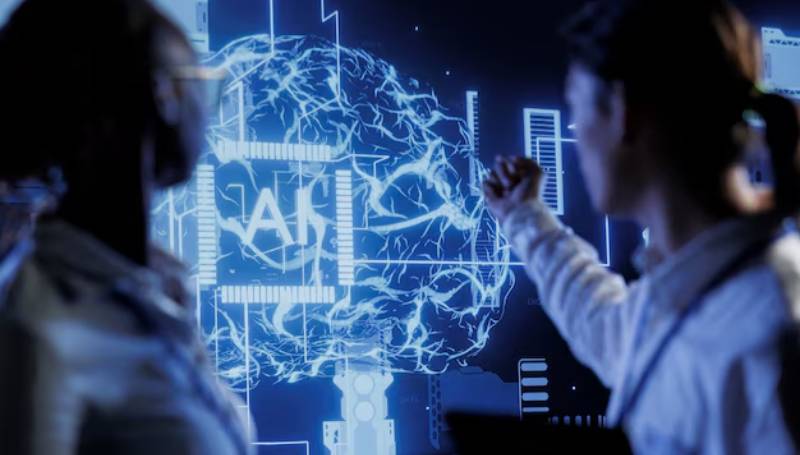Navigating the AI Revolution
Artificial Intelligence has become more than just a buzzword—it’s reshaping how we work, learn, and live. From self-driving cars and voice assistants to predictive analytics and robotics, AI is rewriting the rulebook for almost every industry. But with this rapid transformation comes a wave of uncertainty. Traditional career paths are evolving or disappearing while new ones are emerging at a rapid pace.
This shift presents a significant challenge: how do learners, job seekers, and even experienced professionals adapt to such rapidly changing skill requirements? It’s not just about gaining new knowledge; it’s about understanding one’s true strengths and how they align with this new world. That’s where Career Aptitude Testing for AI Careers steps in as a game-changer.
The future workforce needs to be agile, future-ready, and well-matched with their natural abilities. Career Aptitude Testing bridges the gap between a person’s innate potential and the evolving job landscape. It’s like holding a flashlight in the fog—offering clarity, direction, and confidence.
As the job market becomes more AI-centric, the importance of tailored career planning rises. Career Aptitude Testing for AI Careers doesn’t just suggest jobs—it uncovers pathways that are both fulfilling and sustainable in a tech-dominated future. It empowers individuals to make smarter decisions, minimise risk, and align their potential with the world’s digital demands.
Understanding Career Aptitude Testing in a Digital Age
What is Career Aptitude Testing, and how does it work
Career Aptitude Testing is a structured and scientific approach to identifying a person’s natural strengths, cognitive abilities, and problem-solving styles. Unlike basic career quizzes or interest inventories, it delves deep into a person’s cognitive functions, such as verbal reasoning, numerical ability, spatial awareness, logical thinking, and pattern recognition.
Choices are overwhelming, and change is constant; Career Aptitude Testing for AI Careers provides clarity. The process involves answering a series of questions, puzzles, and situational problems designed to reveal where an individual excels naturally. These assessments are often administered online, utilising adaptive algorithms that tailor questions based on responses, thereby ensuring more accurate and personalised results.
By analysing a person’s aptitude profile, the test reveals which fields are best suited, not just based on interest but on potential. When it comes to AI-driven careers, this insight becomes vital. AI roles often require strong analytical thinking, coding logic, pattern interpretation, and strategic planning. The test highlights which of these skills come naturally and which may need development, offering a foundation for growth.
Differentiating aptitude from interest and academic performance
It’s easy to assume that good grades or a strong interest in technology automatically make someone fit for an AI career. But that’s a misconception. Aptitude refers to a person’s natural ability to learn or perform specific tasks. Interests can change, and academic performance may be influenced by teaching methods, motivation, or the environment, but aptitude is a more stable and long-term indicator of capability.
For example, someone might be sincerely interested in AI because it’s trendy. However, suppose their natural aptitude lies in creative storytelling or emotional intelligence rather than logic-based reasoning. In that case, they might be better suited for AI-adjacent fields, such as UX design or AI ethics, rather than hardcore programming. That’s the power of Career Aptitude Testing for AI Careers—it helps avoid mismatches and disappointment.
It prevents individuals from going down a path that may not align with their strengths, saving time, energy, and financial resources. It also opens up unexpected career options within the AI ecosystem that may have otherwise been overlooked.
Role of psychometrics in modern career planning
Psychometrics—the science of measuring mental capabilities and behavioural styles—is the backbone of modern aptitude testing. It brings objectivity to career decisions. Through validated psychological models and data-backed tools, psychometrics ensures that results are not based on guesswork but on scientifically analysed and validated traits.
These tests evaluate a range of skills, including problem-solving speed, decision-making patterns, and adaptability. In the context of Career Aptitude Testing for AI Careers, psychometrics can determine if someone thrives in data-heavy environments, enjoys abstract thinking, or prefers collaborative innovation—all crucial elements in the AI world.
Incorporating psychometrics into career planning not only increases accuracy but also builds self-awareness. It helps individuals understand themselves better and make proactive, informed choices that align with the demands of a digitally evolving workforce.
Mapping Aptitudes to AI-Centric Roles
Identifying analytical, creative, and logic-based strengths
AI careers are as diverse as the minds that drive them. While some roles require high levels of analytical precision, others thrive on creativity or logical deduction. Career Aptitude Testing for AI Careers begins by identifying where someone naturally shines among these three core domains.
Analytical strengths may point toward roles in machine learning, big data, or algorithm development. These individuals enjoy breaking down problems, seeing patterns in chaos, and optimising systems.
Creative thinkers may be ideal for designing AI interfaces, developing human-like interactions in chatbots, or crafting storytelling for AI-generated content. Their originality fuels innovation.
Those with strong logical reasoning often excel in coding, software architecture, robotics, and computational linguistics. They’re the builders and problem-solvers who make AI systems work efficiently.
Recognising these tendencies early through Career Aptitude Testing can guide learners and professionals to the proper subfields within the AI ecosystem.
Matching innate abilities with AI-related careers like data science, robotics, etc.
Each AI role demands a unique blend of skills. Data science, for example, leans heavily on numerical aptitude, statistical reasoning, and logical thinking. Robotics may require strong spatial intelligence and mechanical reasoning. Natural Language Processing (NLP) roles require a balance of linguistic and analytical skills.
Career Aptitude Testing for AI Careers makes these matches possible by mapping individuals’ natural abilities to specific job functions. This mapping helps avoid misalignments and boosts job readiness.
For instance, a test might reveal high abstract reasoning and moderate mathematical ability, suggesting an excellent fit for AI strategy or data analysis roles but not necessarily for deep algorithm programming. This insight allows for smarter upskilling choices and better career outcomes.
Using Career Aptitude Testing to guide future-ready career paths
Being future-ready isn’t optional—it’s essential. Career Aptitude Testing for AI Careers helps individuals identify roles that not only align with their current abilities but also have long-term potential and growth opportunities.
This guidance helps learners focus on high-demand areas such as ethical AI, automation engineering, or augmented reality development. It also supports the development of core competencies early, leading to smoother transitions, increased adaptability, and greater resilience in an ever-evolving career landscape.
By aligning potential with opportunity, the test becomes a roadmap toward not just employment but fulfilment.
Predicting Success in Emerging Tech Careers
How Career Aptitude Testing forecasts potential in AI-intensive domains
AI careers often require dealing with abstract concepts, continuous learning, and creative problem-solving. Career Aptitude Testing for AI Careers uses predictive models to analyse whether someone has the potential to excel in such environments.
These assessments don’t just measure current skills—they highlight how quickly someone can learn, adapt, and innovate. For instance, high scores in abstract reasoning and inductive logic often indicate strong potential in areas such as neural network design or the development of AI algorithms.
This forward-looking insight empowers learners to make confident decisions, even when career paths aren’t yet clearly defined.
Reducing trial-and-error through science-backed assessments
One of the biggest challenges in modern education and career planning is the waste of effort. Students invest years in degrees they later abandon. Professionals enter fields only to burn out or switch halfway. Trial and error is expensive—not just financially, but emotionally as well.
Career Aptitude Testing for AI Careers minimises this risk. Grounding decisions in scientific assessments rather than guesses or trends narrows down suitable options early. This not only reduces stress and confusion but also creates a sense of purpose and momentum.
With this clarity, individuals can avoid detours, focus on strategic upskilling, and move confidently toward a future that fits them.
Increasing the likelihood of long-term job satisfaction and performance
When someone’s natural talents align with their daily tasks, work doesn’t feel like a chore—it becomes meaningful. Career Aptitude Testing for AI Careers increases the chances of this alignment.
Matching aptitude with AI-related roles ensures higher engagement, better performance, and lower attrition. It also contributes to personal growth and career longevity.
This proactive approach not only helps organisations retain talent but also empowers individuals to thrive—emotionally, mentally, and professionally—in a fast-paced, AI-dominated job market.
Early Exposure for Future AI Specialists
Implementing Career Aptitude Testing in schools and early education
The earlier talent is discovered, the better it can be nurtured. Introducing Career Aptitude Testing for AI Careers in Middle and High Schools Can Transform the Way Students Approach Their Futures.
By identifying natural strengths early, schools can provide personalised learning paths, recommend suitable extracurricular activities, and guide students toward relevant courses in STEM and AI fields. It turns career planning from a last-minute scramble into a thoughtful journey.
Schools and educators can use these insights to cultivate AI-ready skills, ensuring that students grow into confident, capable tech professionals.
Helping students discover AI and tech-oriented strengths early
Many students have latent talents they’ve never tapped into—simply because they’ve never been exposed to the right challenges. Career Aptitude Testing acts as a mirror, reflecting untapped potential.
A student who excels in pattern recognition may be a natural fit for machine learning. Another with strong verbal reasoning could thrive in conversational AI design. Early discovery leads to early empowerment.
With guidance, students can explore AI-related clubs, competitions, or courses tailored to their strengths, thereby fostering enthusiasm and boosting their self-confidence.
Building foundational competencies for high-demand AI fields
Once strengths are identified, the next step is to develop the right skills. Career Aptitude Testing for AI Careers acts as the first brick in a strong foundation.
Students can be guided to take relevant subjects, such as coding, logic, or statistics, and work on foundational projects that prepare them for real-world AI roles. This reduces the future learning curve and positions them ahead of their peers.
Rather than drifting through educational choices, students can make intentional, informed moves, equipping themselves early for a world that AI is rapidly shaping.
Re-skilling the Workforce for AI Disruption
Identifying transferable skills for mid-career professionals
The rise of AI has caused a tectonic shift in the global job market, and mid-career professionals are right in the middle of it. Many find themselves asking: “How do I stay relevant?” The answer lies in discovering and leveraging transferable skills—capabilities acquired through experience that can be applied in new, evolving roles.
Skills such as critical thinking, leadership, communication, analytical reasoning, and problem-solving remain timeless and enduring. They need redirection. Career Aptitude Testing for AI Careers helps identify which of these core strengths can be effectively transitioned into AI-focused roles. For instance, a project manager with strong logical reasoning and verbal aptitude might transition into AI product management or AI ethics consultation.
It’s not about starting over—it’s about pivoting smartly. The testing process provides that clarity without the guesswork. It’s like unlocking a hidden version of oneself that’s more aligned with tomorrow’s demands.
Using Career Aptitude Testing for upskilling or lateral transitions
Upskilling isn’t just a buzzword; it’s a matter of survival in the AI era. But which skills should professionals invest in? That’s where Career Aptitude Testing for AI Careers becomes indispensable.
By analysing innate aptitudes, the test suggests realistic and rewarding areas for skill development and improvement. For example, someone with a strong numerical aptitude might benefit more from courses in data analysis or machine learning. In contrast, someone with spatial reasoning may explore opportunities in robotics or AI hardware integration.
It also helps professionals explore lateral transitions. A journalist might move into AI content moderation. An HR executive with good pattern recognition could thrive in people analytics or AI-assisted talent acquisition. The test doesn’t limit—it illuminates.
Creating personalised learning paths based on natural aptitudes
Every learning journey is unique. Instead of a one-size-fits-all curriculum, Career Aptitude Testing for AI Careers enables personalised upskilling roadmaps. It recommends specific areas of development that align with a person’s strengths, learning pace, and long-term goals.
This ensures that professionals don’t waste time chasing skills that don’t fit or resonate. They focus on growth areas where they’re likely to excel—turning learning into a joyful, confidence-building experience rather than a chore.
With these tailored paths, professionals stay motivated, reduce learning fatigue, and transition into AI-centric roles with a competitive edge.
Minimising Career Mismatches in the AI Era
The cost of pursuing the wrong careers in a competitive job market
Choosing the wrong career isn’t just emotionally draining—it can be financially devastating. In an AI-driven world where competition is fierce and expectations are high, pursuing a path misaligned with one’s strengths can lead to constant struggle, burnout, and missed opportunities.
The cost of a wrong choice includes wasted educational expenses, time lost in ineffective jobs, and the toll on mental health for students who switch majors or abandon degrees midway. For professionals, it could mean years of unfulfilling work.
Career Aptitude Testing for AI Careers acts as a preventative tool. It reduces this risk by aligning individuals with paths where they can truly thrive, not just survive.
How Career Aptitude Testing reduces dropout and burnout rates
Dropouts and burnouts often stem from a misalignment between what someone is good at and what they do daily. When a person’s natural abilities are ignored in favour of market trends or external pressure, it leads to disengagement and exhaustion.
Career Aptitude Testing for AI Careers addresses this at its root. By uncovering cognitive preferences and strengths, it recommends career directions that feel energising and fulfilling. When people operate in roles that match their aptitude, they perform better and stay healthier, mentally and emotionally.
In educational institutions, this translates to fewer course changes and improved academic outcomes. In the workplace, it means reduced turnover and increased productivity.
Ensuring alignment between passion, skill, and job relevance
The sweet spot in any career lies where passion, skills, and market demand intersect. Career Aptitude Testing helps find that intersection. Passion without aptitude may lead to frustration. Aptitude without relevance may result in stagnation. Relevance without interest may lead to burnout.
Career Aptitude Testing for AI Careers helps align these three. It helps people not only do what they love but do it well, and in a field that matters.
Whether someone dreams of building intelligent machines or designing ethical AI policies, the test ensures the journey begins on the right foot.
Supporting AI Career Counselling with Data
Integrating test results with AI-driven career guidance tools
Career counselling is transforming. It’s no longer about vague advice—it’s about data-backed, real-time insights. When Career Aptitude Testing for AI Careers is integrated with AI-powered counselling tools, it becomes a powerful decision-making engine.
These tools combine test results with current market trends, job openings, required skills, and industry forecasts to provide laser-sharp guidance. They don’t just suggest options—they rank them, compare them, and explain why they fit.
This makes the counselling process more transparent, empowering, and personalised. And it transforms vague career dreams into actionable plans.
Enabling data-backed, objective counselling for complex choices
Choosing between multiple appealing paths can be overwhelming. Should someone pursue AI research or AI design? Is a transition from finance to data science realistic? Objective counselling—backed by aptitude testing and career data—brings clarity.
Career Aptitude Testing for AI Careers provides raw insight, and counselling platforms layer it with industry intelligence. This dual approach eliminates emotion-driven confusion, enabling fact-based decisions.
It also helps counsellors justify their recommendations with concrete evidence, building trust and accountability in the guidance process.
Making informed career pivots in a volatile tech landscape
The AI landscape is volatile—new jobs appear as quickly as old ones vanish. Making a mid-career pivot in such a climate is daunting. But it’s possible—and rewarding—when guided by insight.
Career Aptitude Testing for AI Careers plays a critical role here. It demonstrates that the pivot is not only possible but also optimal. Whether someone is shifting from marketing to AI-powered customer analytics or from engineering to automation consulting, data-backed aptitude insights reduce the risk.
It’s about making brave moves with confidence, backed by evidence, not guesswork.
Enhancing Employability and Competitive Edge
Standing out in a crowded AI job market with focused skills
The AI job market is booming, but it’s also crowded. Thousands are entering the field every day, many with similar degrees or certifications. So, how does one stand out?
Focused skills rooted in natural aptitude are the key differentiator. Career Aptitude Testing for AI Careers helps pinpoint these skills. Whether it’s a unique combination of logic and creativity or a strong memory and pattern recognition ability, the test reveals what makes someone different—and marketable.
Armed with this knowledge, individuals can tailor their resumes, portfolios, and interviews to highlight authentic strengths that recruiters notice.
Using Career Aptitude Testing to identify niche career domains
The world of AI isn’t limited to data scientists and software engineers. There are countless niche roles—from AI ethics advisors and prompt engineers to cognitive computing consultants and AR developers.
Career Aptitude Testing for AI Careers exposes these less obvious paths. It matches micro-aptitudes with niche roles, revealing careers that align beautifully but often go unnoticed.
These niche domains are often less saturated and more rewarding, both professionally and financially. Identifying them early through aptitude testing provides job seekers with a strategic advantage.
Gaining confidence in one’s path with aptitude-backed choices
Confidence is the silent driver of success. When people know they’re on a path aligned with their strengths, they walk into interviews, classrooms, and offices with conviction.
Career Aptitude Testing for AI Careers replaces confusion with clarity. It confirms that the chosen path isn’t just popular, but right. This validation empowers learners to commit fully, professionals to negotiate better, and career switchers to embrace change boldly.
It’s the kind of confidence that builds thriving, resilient careers in a world that’s only getting more complex.
The Future of Work and the Role of Testing
Preparing for AI careers that don’t exist yet
Some of the most exciting careers of the next decade haven’t been invented yet. Think quantum algorithm auditors or AI-human collaboration designers. Preparing for the unknown might seem impossible, but not with the right tools.
Career Aptitude Testing for AI Careers focuses on foundational aptitudes, not just existing job descriptions. It equips individuals with insight into how they think, learn, and solve problems—traits that will be valuable regardless of how job titles evolve.
By focusing on core competencies, learners are not just job-ready—they’re future-proof.
Lifelong use of Career Aptitude Testing for agile career management
Career planning isn’t a one-time decision anymore. It’s a continuous process. New skills, new interests, new industries—these all require reassessment. Career Aptitude Testing isn’t just for students. It’s a lifelong companion.
From high school to retirement planning, this tool helps individuals realign their careers with their evolving potential. As roles evolve and personal circumstances shift, the test helps maintain agility and alignment.
It becomes a compass for lifelong learning and career development in an ever-changing world.
Embracing a future where human potential and AI coexist harmoniously
AI isn’t here to replace people—it’s here to work with them. The real magic lies in synergy. For that, individuals must know their unique value—their human edge.
Career Aptitude Testing for AI Careers helps define that edge. It reveals where human potential shines brightest, even in AI-dominated settings. It helps craft roles where AI amplifies human skills rather than competing with them.




